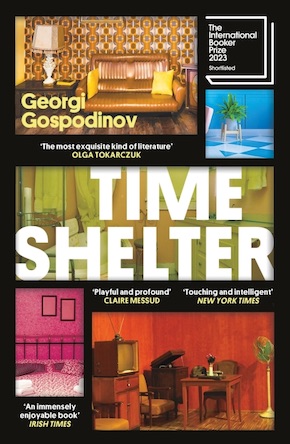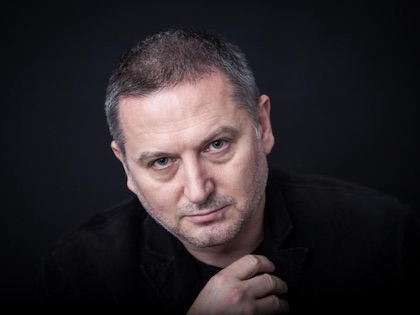My invisible friend
by Georgi Gospodinov
At one point they tried to calculate when time began, when exactly the earth had been created. In the mid–seventeenth century, the Irish bishop Ussher calculated not only the exact year, but also a starting date: October 22, 4,004 years before Christ. It was a Saturday (of course). Some even say Ussher gave a precise time of day as well – around six in the afternoon. Saturday afternoon, that sounds completely believable to me. When else would a bored creator set about building a world and finding himself some company? Ussher devoted years of his life to this, his work itself numbered two thousand pages in Latin; I doubt many have ever made the effort to read the whole thing. Nevertheless, his book became exceptionally popular, well, maybe not the book itself, but the actual discovery. They started to print the Bibles on the island with a date and chronology according to Ussher. This theory of the young earth (and of young time, if you ask me) captivated the Christian world. It should be noted that even scientists like Kepler and Sir Isaac Newton estimated specific years for the divine act of creation that more or less coincided with that of Ussher. But still, the most mind-boggling thing for me is not the year and its relative recency, but the specific day.
October 22, four thousand and four years before Christ, at six in the afternoon.
On or around December 1910, human character changed. So wrote Virginia Woolf. And one can imagine that December 1910, ostensibly like all the others, gray, cold, smelling of fresh snow. But something had been unleashed, which only a few could sense.
On September 1, 1939, early in the morning, came the end of human time.
—
Years later, when many of his memories had already scattered like frightened pigeons, he could still go back to that morning when he was wandering aimlessly through the streets of Vienna, and a vagrant with a mustache like García Márquez’s was selling newspapers on the sidewalk in the early March sun. A wind blew up and several of the newspapers swirled into the air. He tried to help, chasing down two or three and returning them. You can keep one, said Márquez.
Gaustine, that’s what we’ll call him, even though he himself used the name like an invisibility cloak, took the newspaper and handed the man a banknote, a rather large one for the occasion. The vagrant turned it over in his hand and muttered: But… I won’t be able to make change. That sounded so absurd in the Vienna dawn that both of them burst out laughing.
For the homeless, Gaustine felt love and dread, those were the precise words, and always in that combination. He loved them and feared them in the way you love and fear something you have already been or expect to become. He knew that sooner or later he would join their ranks, to use a cliché. He imagined for a moment long lines of homeless people marching down Kärntner and Graben. Yes, by blood he was one of them, albeit a slightly more peculiar case. A vagrant in time, if you will. Simply through a concurrence of circumstances he had ended up with some money, enough to prevent his metaphysical adversity from turning into physical suffering.
At that moment he was practicing one of his professions – that of geriatric psychiatrist. I suspect that he was secretly swiping his patients’ stories so he could take shelter in them, to rest for a bit in someone’s place and past. Otherwise, his head was such a jumble of times, voices, and places that he needed to either place himself immediately in the hands of his fellow psychiatrists or he would do something that would force them to put him away themselves.
Gaustine took the newspaper, walked a little way, and sat down on a bench. He was wearing a Borsalino, a dark trench coat, beneath which the high collar of his turtleneck was visible, old leather boots, and he carried a leather bag in a nobly fading red. He looked like a man who had just arrived by train from some other decade; he could have passed for a discreet anarchist, an aging hippie, or a preacher from an obscure denomination. And so, he sat down on the bench and read the name of the newspaper – Augustin, published by the homeless. Some of the paper was written by them, some by professional journalists. And there, on the second-to-last page down in the left-hand corner, the most inconspicuous place in a newspaper as all editors well know, was the article. His gaze fell upon it. A thin smile that held more bitterness than joy flitted across his face. He would have to disappear again.
My invisible friend, more real and visible than my very self. The difference between us was slight, but fundamental. I remained an outsider everywhere, while he felt equally at home in all times.”
Some time ago, when Dr. Alzheimer was still mentioned mainly in jokes – So what’s your diagnosis? It was some guy’s name, but I forgot it – a short article appeared in a small newspaper, one of those news items that was read by five people, four of whom instantly forgot it.
Here is the article, retold in brief:
A certain medical professional, Dr. G. (mentioned only by initial), from a Vienna geriatric clinic in Wienerwald, a fan of the Beatles, decked out his office in the style of the ’60s. He found a Bakelite gramophone, put up posters of the band, including the famous Sgt. Pepper album cover… From the flea market he bought an old cabinet and lined it with all sorts of tchotchkes from the ’60s – soap, cigarette boxes, a set of miniature Volkswagen Beetles, Mustangs and pink Cadillacs, playbills from movies, photos of actors. The article noted that his office was piled full of old magazines, and he himself was always dressed in a turtleneck under his white coat. There was no photo, of course, the whole piece was all of thirty lines long, stuffed into the lower left-hand corner. The news here was that the doctor had noticed that patients with memory issues were staying longer and longer in his office; they became more talkative, in other words, they felt at home. And that had radically reduced the number of attempts to run away from that otherwise prestigious clinic. The article had no author.
That was my idea, I’ve had it in my head for years, but clearly somebody beat me to it. (I must admit that in my case the idea was for a novel, but still.)
Whenever possible, I always supplied myself with that homeless newspaper, on the one hand due to my particular attachment to those who wrote it (a long story from another novel), but also because of the clear feeling (a personal superstition) that precisely in this way, through a scrap of newspaper, what must be said comes fluttering down gently or hits you upside the head. And this has never led me astray.
The paper said that the clinic was in the Vienna Woods and nothing more. I checked the geriatric centers nearby, and at least three of them were located in those woods. The one I needed turned out to be the last one I checked, of course. I introduced myself as a journalist, which actually wasn’t such a big fib; I had an ID card from a newspaper so I could get into museums for free, and sometimes I actually wrote for it. Otherwise I used the related, but far more innocent and elusive profession of writer, for which there is no way to legitimize yourself.
Anyway, I managed to reach – with quite a bit of difficulty, I might add – the director of the clinic. When she realized what I was interested in, she suddenly became curt: The individual you are looking for is no longer here as of yesterday. Why? He resigned by mutual consent, she replied, stepping onto the slippery slope of bureaucratic-speak. Was he fired? I asked, sincerely astonished.
I told you, mutual consent. Why are you so interested? I read an interesting article in the newspaper a week ago… Even as the phrase left my lips, I realized I had made a mistake. That article about attempts to run away from the clinic? We have submitted a claim for a retraction.
I realized I had no cause to stay any longer; I also understood the reason for the resignation by mutual consent. What was the doctor’s name? I asked, turning back just before leaving, but she was already talking on the phone.
I didn’t leave the clinic immediately. I found the wing with the doctors’ offices and saw a worker taking the sign down from the third door on the right. Of course that was the name. I had suspected this from the very start.
—
To catch a trace of Gaustine, who jumped from decade to decade just as we change planes at an airport, is a chance that comes along only once a century. Gaustine, whom I first invented, and then met in flesh and blood. Or perhaps it was the opposite, I don’t remember. My invisible friend, more real and visible than my very self. The Gaustine of my youth, the Gaustine of my dreams of being someone else, somewhere else, of inhabiting other times and other rooms. We shared a common obsession with the past. The difference between us was slight, but fundamental. I remained an outsider everywhere, while he felt equally at home in all times. I knocked on the doors of various years, but he was already inside, ushering me in and then disappearing.
from Time Shelter, translated by Angela Rodel (Weidenfeld & Nicolson, £9.99)
—

Georgi Gospodinov was born in Yambol, Bulgaria, in 1968. His works have been translated to acclaim in 25 languages, have been shortlisted for more than a dozen international prizes – including the PEN Literary Award for Translation, the Premio Gregor von Rezzori, the Bruecke Berlin Preis, and the Haus der Kulturen der Welt Literaturpreis – and have won the 2016 Jan Michalski Prize for Literature, the 2019 Angelus Literature Central Europe Prize and the 2021 Premio Strega Europe, among others. Time Shelter is published by Weidenfeld & Nicolson in paperback, eBook and audio download, and shortlisted for the 2023 International Booker Prize.
Read more
georgigospodinov.com
@Gospodinov68
@wnbooks
@TheBookerPrizes
Author photo by Phelia Baruh
Angela Rodel is a musician and literary translator who lives and works in Bulgaria. She holds degrees from Yale and UCLA, and has received NEA and PEN translation grants. Her translation of Georgi Gospodinov’s Physics of Sorrow won the 2016 AATSEEL Prize for Literary Translation.
@rodel_angela

Catch Georgi and other great storytellers from around the continent at the EUNIC/European Literature Network-backed European Writers’ Festival at the British Library, where he is on the panel ‘Stories from the New Europe’ on Saturday 20 May with Viola Di Grado (Italy), Zsófia Bán (Hungary), Jan Carson (Ireland) and Witold Szabłowski (Poland), chaired by Rosie Goldsmith.
Saturday pass £10; Weekend pass £17 (Concessions from £5/£8.50)
More info and book

